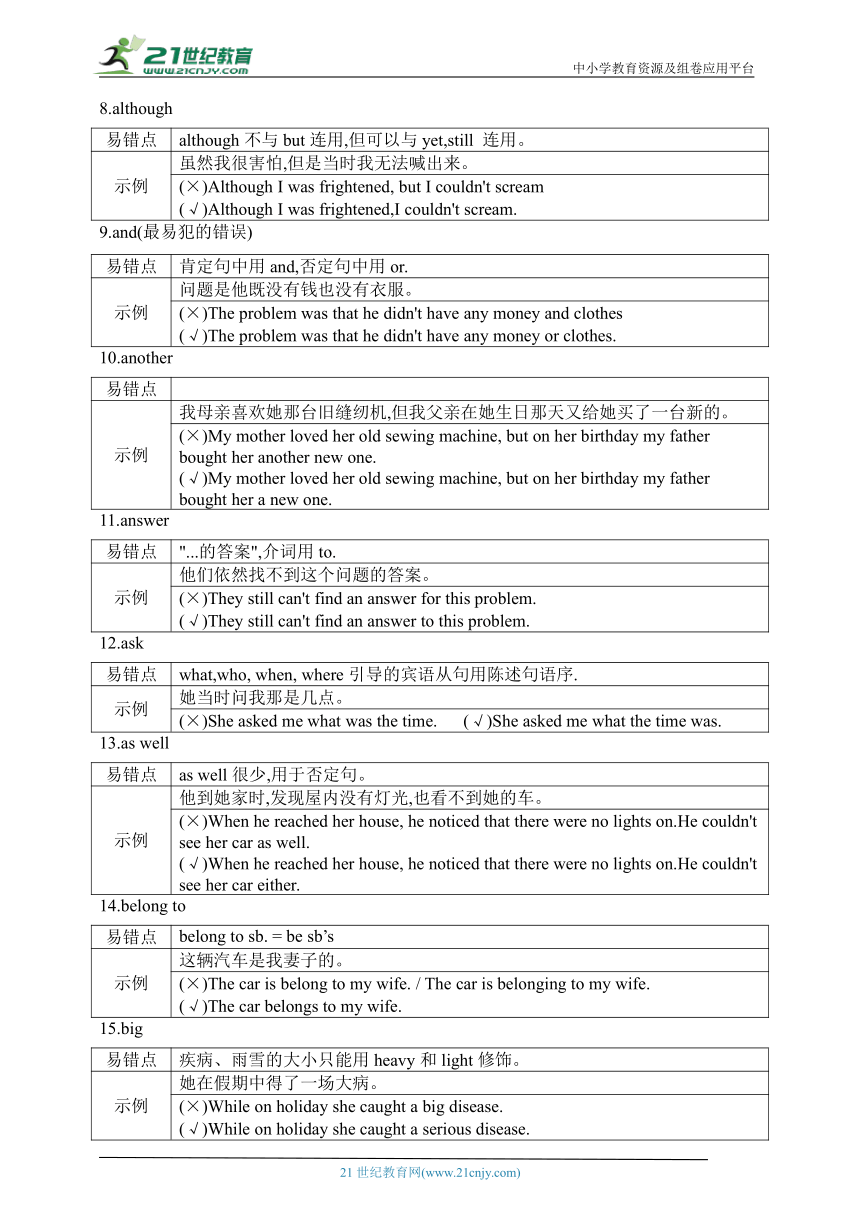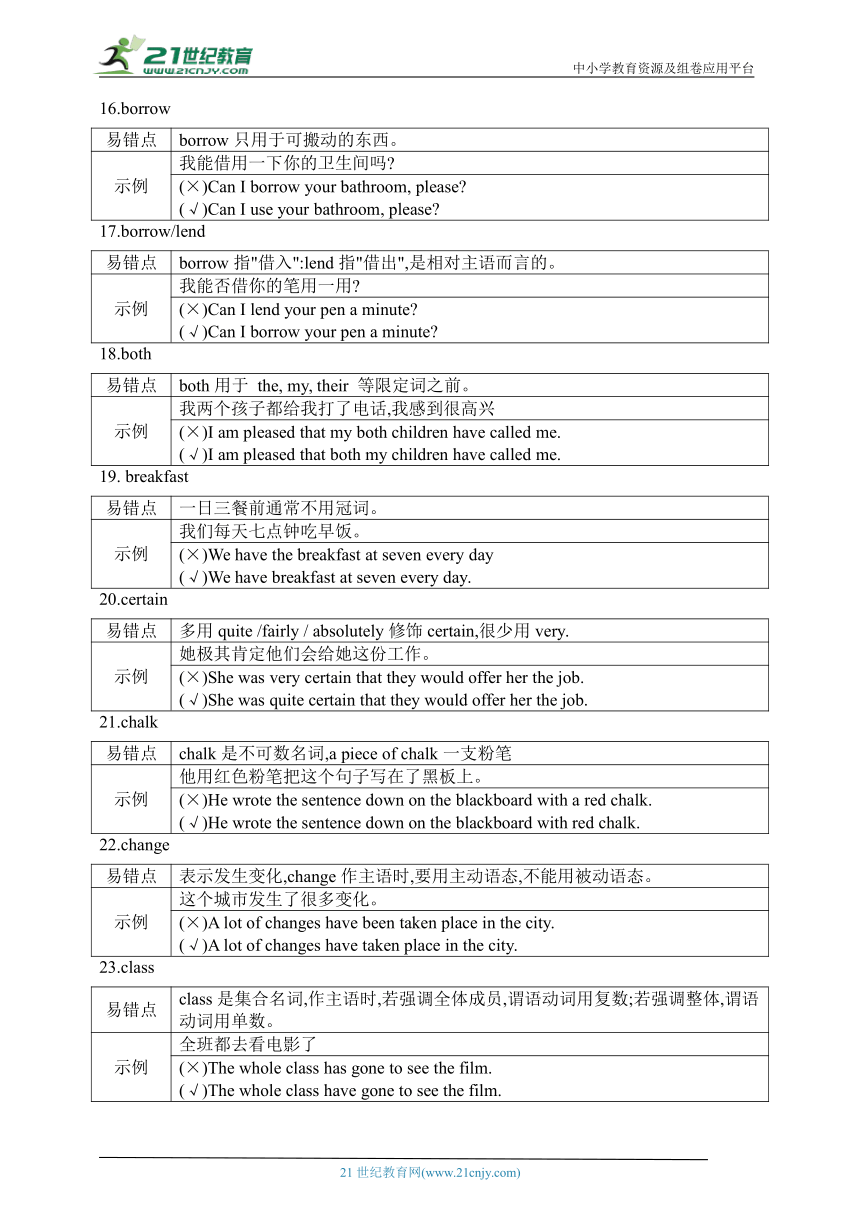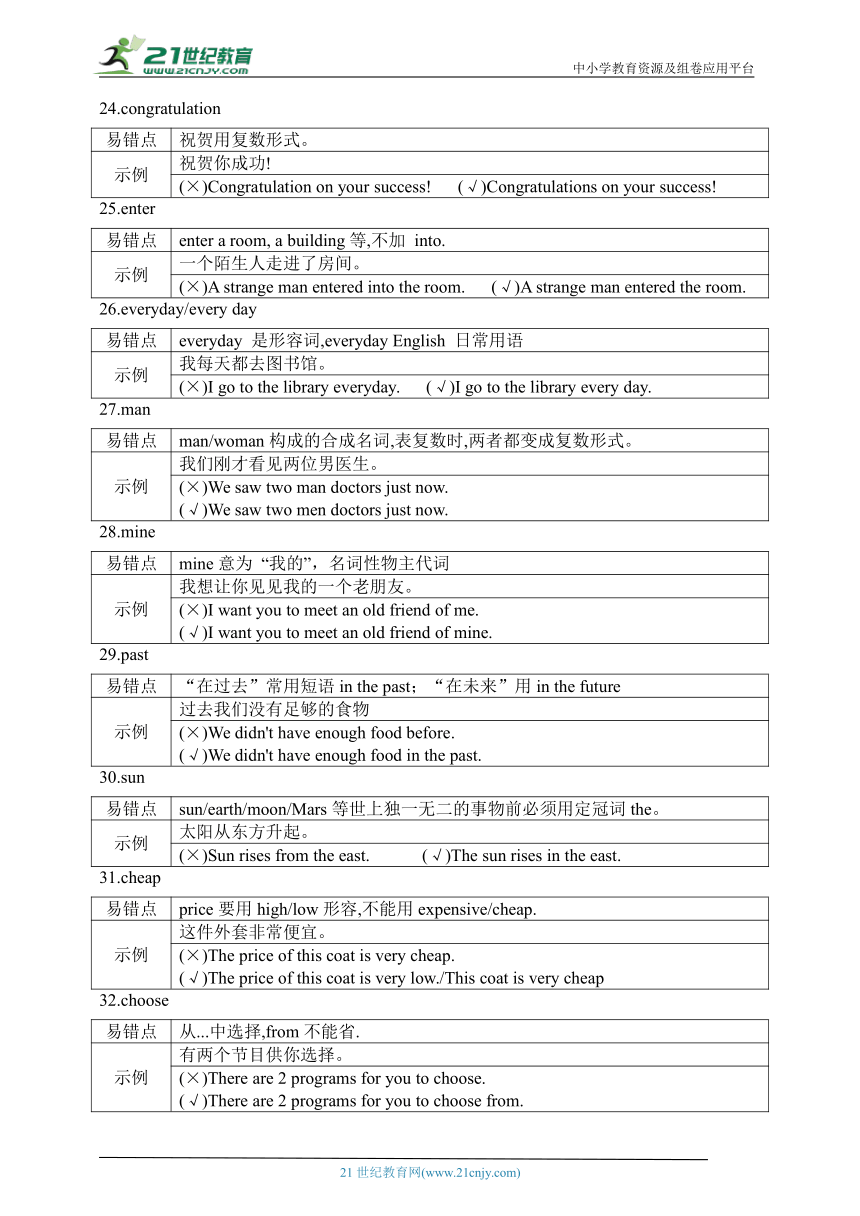【备考2025】表格梳理新目标英语英语易错知识点汇总(上)
文档属性
| 名称 | 【备考2025】表格梳理新目标英语英语易错知识点汇总(上) |  | |
| 格式 | docx | ||
| 文件大小 | 301.5KB | ||
| 资源类型 | 试卷 | ||
| 版本资源 | 通用版 | ||
| 科目 | 英语 | ||
| 更新时间 | 2024-08-15 07:46:11 | ||
图片预览




文档简介
中小学教育资源及组卷应用平台
表格梳理新目标英语英语易错知识点汇总(上)
1.a/an
易错点 a用于以辅音因素为首的词前;an用于以元音因素为首的词前。
示例 我有一个MP4
(×)I have a MP4. (√)I have an MP4.
安有一张诚实的面孔。
(×)Ann has a honest face. (√)Ann has an honest face.
英语是一门有用的语言。
(×)English is an useful language. (√)English is a useful language.
2.advice
易错点
示例 她给了我一点/一些好建议。
(×)She gave me a good advice (√)She gave me n good piece of advice / some good advice.
3.afford
易错点 一般不用 money作 afford宾语。
示例 我承担不起买一件新外套的钱。/我买不起一件新外套。
(×)I can't afford the money for a new coat. (√)I can't afford (to buy) a new coat
4.after
易错点 在after.as soon as等引导的时间状语从句中,用一般现在时表示将来。
示例 你走后我们会每天给你写信。
(×)After you will leave, we will write to you every day (√)After you leave, we will write to you every day.
5.afternoon
易错点 指一个特定的上午、下午、傍晚介词用on。泛指在上午、下午、傍晚,介词用in,noon和night前用介词at。
示例 在七月三日下午
(×)in the afternoon of 3rd July (√)on the afternoon of 3rd July
6.all
易错点 all通常放在第一个助动词之后或实意动词之前,如果实意动词是be,all紧跟其后。
示例 我们听到这个消息都很高兴。
(×)We all were delighted when we heard the news. (√)We were all delighted when we heard the news.
7.allow
易错点 allow 不用于"It is not allowed to do sth."结构。
示例 这里不允许吸烟。
(×)It is not allowed to smoke here. (√)Smoking is not allowed here./ People are not allowed to smoke here.
8.although
易错点 although不与but连用,但可以与yet,still 连用。
示例 虽然我很害怕,但是当时我无法喊出来。
(×)Although I was frightened, but I couldn't scream (√)Although I was frightened,I couldn't scream.
9.and(最易犯的错误)
易错点 肯定句中用and,否定句中用or.
示例 问题是他既没有钱也没有衣服。
(×)The problem was that he didn't have any money and clothes (√)The problem was that he didn't have any money or clothes.
10.another
易错点
示例 我母亲喜欢她那台旧缝纫机,但我父亲在她生日那天又给她买了一台新的。
(×)My mother loved her old sewing machine, but on her birthday my father bought her another new one. (√)My mother loved her old sewing machine, but on her birthday my father bought her a new one.
11.answer
易错点 "...的答案",介词用to.
示例 他们依然找不到这个问题的答案。
(×)They still can't find an answer for this problem. (√)They still can't find an answer to this problem.
12.ask
易错点 what,who, when, where引导的宾语从句用陈述句语序.
示例 她当时问我那是几点。
(×)She asked me what was the time. (√)She asked me what the time was.
13.as well
易错点 as well很少,用于否定句。
示例 他到她家时,发现屋内没有灯光,也看不到她的车。
(×)When he reached her house, he noticed that there were no lights on.He couldn't see her car as well. (√)When he reached her house, he noticed that there were no lights on.He couldn't see her car either.
14.belong to
易错点 belong to sb. = be sb’s
示例 这辆汽车是我妻子的。
(×)The car is belong to my wife. / The car is belonging to my wife. (√)The car belongs to my wife.
15.big
易错点 疾病、雨雪的大小只能用heavy和light修饰。
示例 她在假期中得了一场大病。
(×)While on holiday she caught a big disease. (√)While on holiday she caught a serious disease.
16.borrow
易错点 borrow只用于可搬动的东西。
示例 我能借用一下你的卫生间吗
(×)Can I borrow your bathroom, please (√)Can I use your bathroom, please
17.borrow/lend
易错点 borrow指"借入":lend指"借出",是相对主语而言的。
示例 我能否借你的笔用一用
(×)Can I lend your pen a minute (√)Can I borrow your pen a minute
18.both
易错点 both用于 the, my, their 等限定词之前。
示例 我两个孩子都给我打了电话,我感到很高兴
(×)I am pleased that my both children have called me. (√)I am pleased that both my children have called me.
19. breakfast
易错点 一日三餐前通常不用冠词。
示例 我们每天七点钟吃早饭。
(×)We have the breakfast at seven every day (√)We have breakfast at seven every day.
20.certain
易错点 多用quite /fairly / absolutely修饰certain,很少用very.
示例 她极其肯定他们会给她这份工作。
(×)She was very certain that they would offer her the job. (√)She was quite certain that they would offer her the job.
21.chalk
易错点 chalk是不可数名词,a piece of chalk一支粉笔
示例 他用红色粉笔把这个句子写在了黑板上。
(×)He wrote the sentence down on the blackboard with a red chalk. (√)He wrote the sentence down on the blackboard with red chalk.
22.change
易错点 表示发生变化,change作主语时,要用主动语态,不能用被动语态。
示例 这个城市发生了很多变化。
(×)A lot of changes have been taken place in the city. (√)A lot of changes have taken place in the city.
23.class
易错点 class是集合名词,作主语时,若强调全体成员,谓语动词用复数;若强调整体,谓语动词用单数。
示例 全班都去看电影了
(×)The whole class has gone to see the film. (√)The whole class have gone to see the film.
24.congratulation
易错点 祝贺用复数形式。
示例 祝贺你成功!
(×)Congratulation on your success! (√)Congratulations on your success!
25.enter
易错点 enter a room, a building等,不加 into.
示例 一个陌生人走进了房间。
(×)A strange man entered into the room. (√)A strange man entered the room.
26.everyday/every day
易错点 everyday 是形容词,everyday English 日常用语
示例 我每天都去图书馆。
(×)I go to the library everyday. (√)I go to the library every day.
27.man
易错点 man/woman构成的合成名词,表复数时,两者都变成复数形式。
示例 我们刚才看见两位男医生。
(×)We saw two man doctors just now. (√)We saw two men doctors just now.
28.mine
易错点 mine意为 “我的”,名词性物主代词
示例 我想让你见见我的一个老朋友。
(×)I want you to meet an old friend of me. (√)I want you to meet an old friend of mine.
29.past
易错点 “在过去”常用短语in the past;“在未来”用in the future
示例 过去我们没有足够的食物
(×)We didn't have enough food before. (√)We didn't have enough food in the past.
30.sun
易错点 sun/earth/moon/Mars等世上独一无二的事物前必须用定冠词the。
示例 太阳从东方升起。
(×)Sun rises from the east. (√)The sun rises in the east.
31.cheap
易错点 price要用high/low形容,不能用expensive/cheap.
示例 这件外套非常便宜。
(×)The price of this coat is very cheap. (√)The price of this coat is very low./This coat is very cheap
32.choose
易错点 从...中选择,from不能省.
示例 有两个节目供你选择。
(×)There are 2 programs for you to choose. (√)There are 2 programs for you to choose from.
33.church
易错点 go to church 做礼拜:go to the church 去教堂
示例 我父母每周日都去做礼拜
(×)My parents go to the church every Sunday (√)My parents go to church every Sunday.
34.clothing
易错点 clothing是衣服的总称,为不可数名词;clothes为复数名词,比clothing 更常用。
示例 这些妇女在售卖二手衣服。
(×)The women are selling second-hand clothings. (√)The women are selling second-hand clothes /clothing.
e from
易错点 come from(出生于;来自)不用于进行时。
示例 那些日本学生非常刻苦。
(×)The students who are coming from Japan are hard-working. (√)The students who come from Japan are hard-working.
mon
易错点 没有"it is common that ..."句式,只有it is common for sb to do sth"。
示例 现在妇女出去工作很普遍。
(×)Nowadays it is common that women go out to work (√)Nowadays it is common for women to go out to work.
37.cooker
易错点 cooker 厨具;cook厨师
示例 我太太烧菜是一流好手
(×)My wife is an excellent cooker. (√)My wife is an excellent cook.
38.cup
易错点 "一杯茶/咖啡用a cup of;"一杯水/葡萄酒/啤酒/香槟"用a glass of
示例 我们进餐时喝了一杯酒。
(×)We enjoyed a cup of wine with our meal. (√)We enjoyed a glass of wine with our meal.
39.day
易错点 these days 前不用介词;in those days 可以。
示例 现在我不大锻炼了。
(×)I don't do much exercise in these days. (√)I don't do much exercise these days.
40.dead
易错点 die是短暂性动词,不能与一段时间连用。
示例 她的母亲去世十年了。
(×)Her mother has died for ten years. f:Her mother has been dead for ten years./Her mother died ten years ago
41.despite
易错点 despite 是介词,不能接从句。
示例 尽管火车车厢很空,他却过来坐在我前面。
(×)Despite the train was empty, he came and sat in front of me. (√)Despite the train being empty, he came and sat in front of me.
42.difficult
示例 风太大,我很难在户外把火生起来。
(×)It was very difficult to make a fire in the open because of the wind. (√)It was very difficult for me to make a fire in the open because of the wind.
43.discount
示例 他以九折的价钱买了这房子。
(×)He bought the house at a 90% discount. (√)He bought the house at a 10% discount.
44.discuss
易错点 discuss为及物动词,后不用介词,直接接宾语。
示例 我们花了两小时讨论这个课程。
(×)We spent two hours discussing about the course. (√)We spent two hours discussing the course.
45.dozen
易错点 dozen 被具体数字修饰时用单数:dozens of指"许多"。
示例 我买了24个苹果。
(×)I bought two dozens of apples. (√)I bought two dozen of apples.
46.each
易错点
示例 他们每个人都有个漂亮的女儿。
(×)They each has a beautiful daughter. (√)They each have a beautiful daughter.
47.efficient
易错点 efficient效率高的;effective有效的
示例 这药证明非常有效
(×)The medicine proved very efficient. (√)The medicine proved very effective.
48.elder
易错点 older是比较级形容词,不能用作名词;elder这里是名词,指家庭里的年长者。
示例 这两位女士是李生姐妹。你能分清哪位是年长者吗
(×)The two ladies are twins. Can you tell which is the older (√)The two ladies are twins. Can you tell which is the elder
49.elect
易错点 选举某人任某职务用"elect sb (as) sth"。
示例 他们选史密斯当市长。
(×)They elected Smith as the mayor. (√)They elected Smith as mayor.
50.else
易错点 else构成所有格时,-s加在else之后,如someone else's.
示例 他的工作比别的任何人的都要好
(×)His work is better than anyone's else (√)His work is better than anyone else's.
51.enough
易错点 除了主语是there,it或一定的数量/数目外,enough一般不用作表语。
示例 我们没有足够的时间赶下一班火车。
(×)The time isn't enough for us to catch the next train (√)There isn't enough time for us to catch the next train.
52.evening
易错点 在具体某天的上、下午、晚上,介词用on不用in。
示例 我是在5月15日晚上到家的。
(×)I arrived home in the evening of May 15th. (√)I arrived home on the evening of May 15th.
53.every
易错点 every意为“每一”,他所修饰的名词不能用复数形式。
示例 每隔三个星期我就得到医院去看病。
(×)I have to visit the hospital every three week. (√)I have to visit the hospital every three weeks.
54.everyone /every one
易错点 everyone每个人;人人;everyone一群人或物中的每一个
示例 如果大家都准备好了,我就开始。
(×)If every one is ready, Ill begin. (√)If everyone is ready, I'll begin.
在这三年里,我们每个人都交了一些朋友。
(×)Everyone of us has made some friends during these 3 years. (√)Every one of us has made some friends during these 3 years.
21世纪教育网 www.21cnjy.com 精品试卷·第 2 页 (共 2 页)
21世纪教育网(www.21cnjy.com)
表格梳理新目标英语英语易错知识点汇总(上)
1.a/an
易错点 a用于以辅音因素为首的词前;an用于以元音因素为首的词前。
示例 我有一个MP4
(×)I have a MP4. (√)I have an MP4.
安有一张诚实的面孔。
(×)Ann has a honest face. (√)Ann has an honest face.
英语是一门有用的语言。
(×)English is an useful language. (√)English is a useful language.
2.advice
易错点
示例 她给了我一点/一些好建议。
(×)She gave me a good advice (√)She gave me n good piece of advice / some good advice.
3.afford
易错点 一般不用 money作 afford宾语。
示例 我承担不起买一件新外套的钱。/我买不起一件新外套。
(×)I can't afford the money for a new coat. (√)I can't afford (to buy) a new coat
4.after
易错点 在after.as soon as等引导的时间状语从句中,用一般现在时表示将来。
示例 你走后我们会每天给你写信。
(×)After you will leave, we will write to you every day (√)After you leave, we will write to you every day.
5.afternoon
易错点 指一个特定的上午、下午、傍晚介词用on。泛指在上午、下午、傍晚,介词用in,noon和night前用介词at。
示例 在七月三日下午
(×)in the afternoon of 3rd July (√)on the afternoon of 3rd July
6.all
易错点 all通常放在第一个助动词之后或实意动词之前,如果实意动词是be,all紧跟其后。
示例 我们听到这个消息都很高兴。
(×)We all were delighted when we heard the news. (√)We were all delighted when we heard the news.
7.allow
易错点 allow 不用于"It is not allowed to do sth."结构。
示例 这里不允许吸烟。
(×)It is not allowed to smoke here. (√)Smoking is not allowed here./ People are not allowed to smoke here.
8.although
易错点 although不与but连用,但可以与yet,still 连用。
示例 虽然我很害怕,但是当时我无法喊出来。
(×)Although I was frightened, but I couldn't scream (√)Although I was frightened,I couldn't scream.
9.and(最易犯的错误)
易错点 肯定句中用and,否定句中用or.
示例 问题是他既没有钱也没有衣服。
(×)The problem was that he didn't have any money and clothes (√)The problem was that he didn't have any money or clothes.
10.another
易错点
示例 我母亲喜欢她那台旧缝纫机,但我父亲在她生日那天又给她买了一台新的。
(×)My mother loved her old sewing machine, but on her birthday my father bought her another new one. (√)My mother loved her old sewing machine, but on her birthday my father bought her a new one.
11.answer
易错点 "...的答案",介词用to.
示例 他们依然找不到这个问题的答案。
(×)They still can't find an answer for this problem. (√)They still can't find an answer to this problem.
12.ask
易错点 what,who, when, where引导的宾语从句用陈述句语序.
示例 她当时问我那是几点。
(×)She asked me what was the time. (√)She asked me what the time was.
13.as well
易错点 as well很少,用于否定句。
示例 他到她家时,发现屋内没有灯光,也看不到她的车。
(×)When he reached her house, he noticed that there were no lights on.He couldn't see her car as well. (√)When he reached her house, he noticed that there were no lights on.He couldn't see her car either.
14.belong to
易错点 belong to sb. = be sb’s
示例 这辆汽车是我妻子的。
(×)The car is belong to my wife. / The car is belonging to my wife. (√)The car belongs to my wife.
15.big
易错点 疾病、雨雪的大小只能用heavy和light修饰。
示例 她在假期中得了一场大病。
(×)While on holiday she caught a big disease. (√)While on holiday she caught a serious disease.
16.borrow
易错点 borrow只用于可搬动的东西。
示例 我能借用一下你的卫生间吗
(×)Can I borrow your bathroom, please (√)Can I use your bathroom, please
17.borrow/lend
易错点 borrow指"借入":lend指"借出",是相对主语而言的。
示例 我能否借你的笔用一用
(×)Can I lend your pen a minute (√)Can I borrow your pen a minute
18.both
易错点 both用于 the, my, their 等限定词之前。
示例 我两个孩子都给我打了电话,我感到很高兴
(×)I am pleased that my both children have called me. (√)I am pleased that both my children have called me.
19. breakfast
易错点 一日三餐前通常不用冠词。
示例 我们每天七点钟吃早饭。
(×)We have the breakfast at seven every day (√)We have breakfast at seven every day.
20.certain
易错点 多用quite /fairly / absolutely修饰certain,很少用very.
示例 她极其肯定他们会给她这份工作。
(×)She was very certain that they would offer her the job. (√)She was quite certain that they would offer her the job.
21.chalk
易错点 chalk是不可数名词,a piece of chalk一支粉笔
示例 他用红色粉笔把这个句子写在了黑板上。
(×)He wrote the sentence down on the blackboard with a red chalk. (√)He wrote the sentence down on the blackboard with red chalk.
22.change
易错点 表示发生变化,change作主语时,要用主动语态,不能用被动语态。
示例 这个城市发生了很多变化。
(×)A lot of changes have been taken place in the city. (√)A lot of changes have taken place in the city.
23.class
易错点 class是集合名词,作主语时,若强调全体成员,谓语动词用复数;若强调整体,谓语动词用单数。
示例 全班都去看电影了
(×)The whole class has gone to see the film. (√)The whole class have gone to see the film.
24.congratulation
易错点 祝贺用复数形式。
示例 祝贺你成功!
(×)Congratulation on your success! (√)Congratulations on your success!
25.enter
易错点 enter a room, a building等,不加 into.
示例 一个陌生人走进了房间。
(×)A strange man entered into the room. (√)A strange man entered the room.
26.everyday/every day
易错点 everyday 是形容词,everyday English 日常用语
示例 我每天都去图书馆。
(×)I go to the library everyday. (√)I go to the library every day.
27.man
易错点 man/woman构成的合成名词,表复数时,两者都变成复数形式。
示例 我们刚才看见两位男医生。
(×)We saw two man doctors just now. (√)We saw two men doctors just now.
28.mine
易错点 mine意为 “我的”,名词性物主代词
示例 我想让你见见我的一个老朋友。
(×)I want you to meet an old friend of me. (√)I want you to meet an old friend of mine.
29.past
易错点 “在过去”常用短语in the past;“在未来”用in the future
示例 过去我们没有足够的食物
(×)We didn't have enough food before. (√)We didn't have enough food in the past.
30.sun
易错点 sun/earth/moon/Mars等世上独一无二的事物前必须用定冠词the。
示例 太阳从东方升起。
(×)Sun rises from the east. (√)The sun rises in the east.
31.cheap
易错点 price要用high/low形容,不能用expensive/cheap.
示例 这件外套非常便宜。
(×)The price of this coat is very cheap. (√)The price of this coat is very low./This coat is very cheap
32.choose
易错点 从...中选择,from不能省.
示例 有两个节目供你选择。
(×)There are 2 programs for you to choose. (√)There are 2 programs for you to choose from.
33.church
易错点 go to church 做礼拜:go to the church 去教堂
示例 我父母每周日都去做礼拜
(×)My parents go to the church every Sunday (√)My parents go to church every Sunday.
34.clothing
易错点 clothing是衣服的总称,为不可数名词;clothes为复数名词,比clothing 更常用。
示例 这些妇女在售卖二手衣服。
(×)The women are selling second-hand clothings. (√)The women are selling second-hand clothes /clothing.
e from
易错点 come from(出生于;来自)不用于进行时。
示例 那些日本学生非常刻苦。
(×)The students who are coming from Japan are hard-working. (√)The students who come from Japan are hard-working.
mon
易错点 没有"it is common that ..."句式,只有it is common for sb to do sth"。
示例 现在妇女出去工作很普遍。
(×)Nowadays it is common that women go out to work (√)Nowadays it is common for women to go out to work.
37.cooker
易错点 cooker 厨具;cook厨师
示例 我太太烧菜是一流好手
(×)My wife is an excellent cooker. (√)My wife is an excellent cook.
38.cup
易错点 "一杯茶/咖啡用a cup of;"一杯水/葡萄酒/啤酒/香槟"用a glass of
示例 我们进餐时喝了一杯酒。
(×)We enjoyed a cup of wine with our meal. (√)We enjoyed a glass of wine with our meal.
39.day
易错点 these days 前不用介词;in those days 可以。
示例 现在我不大锻炼了。
(×)I don't do much exercise in these days. (√)I don't do much exercise these days.
40.dead
易错点 die是短暂性动词,不能与一段时间连用。
示例 她的母亲去世十年了。
(×)Her mother has died for ten years. f:Her mother has been dead for ten years./Her mother died ten years ago
41.despite
易错点 despite 是介词,不能接从句。
示例 尽管火车车厢很空,他却过来坐在我前面。
(×)Despite the train was empty, he came and sat in front of me. (√)Despite the train being empty, he came and sat in front of me.
42.difficult
示例 风太大,我很难在户外把火生起来。
(×)It was very difficult to make a fire in the open because of the wind. (√)It was very difficult for me to make a fire in the open because of the wind.
43.discount
示例 他以九折的价钱买了这房子。
(×)He bought the house at a 90% discount. (√)He bought the house at a 10% discount.
44.discuss
易错点 discuss为及物动词,后不用介词,直接接宾语。
示例 我们花了两小时讨论这个课程。
(×)We spent two hours discussing about the course. (√)We spent two hours discussing the course.
45.dozen
易错点 dozen 被具体数字修饰时用单数:dozens of指"许多"。
示例 我买了24个苹果。
(×)I bought two dozens of apples. (√)I bought two dozen of apples.
46.each
易错点
示例 他们每个人都有个漂亮的女儿。
(×)They each has a beautiful daughter. (√)They each have a beautiful daughter.
47.efficient
易错点 efficient效率高的;effective有效的
示例 这药证明非常有效
(×)The medicine proved very efficient. (√)The medicine proved very effective.
48.elder
易错点 older是比较级形容词,不能用作名词;elder这里是名词,指家庭里的年长者。
示例 这两位女士是李生姐妹。你能分清哪位是年长者吗
(×)The two ladies are twins. Can you tell which is the older (√)The two ladies are twins. Can you tell which is the elder
49.elect
易错点 选举某人任某职务用"elect sb (as) sth"。
示例 他们选史密斯当市长。
(×)They elected Smith as the mayor. (√)They elected Smith as mayor.
50.else
易错点 else构成所有格时,-s加在else之后,如someone else's.
示例 他的工作比别的任何人的都要好
(×)His work is better than anyone's else (√)His work is better than anyone else's.
51.enough
易错点 除了主语是there,it或一定的数量/数目外,enough一般不用作表语。
示例 我们没有足够的时间赶下一班火车。
(×)The time isn't enough for us to catch the next train (√)There isn't enough time for us to catch the next train.
52.evening
易错点 在具体某天的上、下午、晚上,介词用on不用in。
示例 我是在5月15日晚上到家的。
(×)I arrived home in the evening of May 15th. (√)I arrived home on the evening of May 15th.
53.every
易错点 every意为“每一”,他所修饰的名词不能用复数形式。
示例 每隔三个星期我就得到医院去看病。
(×)I have to visit the hospital every three week. (√)I have to visit the hospital every three weeks.
54.everyone /every one
易错点 everyone每个人;人人;everyone一群人或物中的每一个
示例 如果大家都准备好了,我就开始。
(×)If every one is ready, Ill begin. (√)If everyone is ready, I'll begin.
在这三年里,我们每个人都交了一些朋友。
(×)Everyone of us has made some friends during these 3 years. (√)Every one of us has made some friends during these 3 years.
21世纪教育网 www.21cnjy.com 精品试卷·第 2 页 (共 2 页)
21世纪教育网(www.21cnjy.com)
